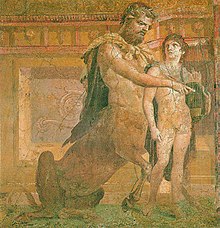Chiron
![]()
This article is about the mythological person Cheiron, son of Kronos, for other meanings of Cheiron or Chiron see Chiron.
Cheiron (Ancient Greek Χείρων "hand", Latin Chiron) is the son of Cronus and Philyra, half-brother of Zeus and one of the Centaurs in Greek mythology.
Physically, he resembles the wild horse-human hybrids descended from Ixion, but he himself is of a different origin: in order not to be discovered by his wife Rhea, Kronos is said to have fathered him with Philyra in the form of a horse. Already in the Iliad he is placed high above the other centaurs in terms of his nature: He is considered the most righteous of the centaurs. He is a friend of the gods, educator of the heroes Jason, Aktaion, Aristaios, Achilleus, Kephalos, Meilanion, Nestor, Amphiaraos, Peleus, Telamon, Meleagros, Theseus, Hippolytos, Palamedes, Menestheus, Odysseus, Diomedes, Kastor, Polydeukes, Machaon, Podaleirios, Antilochos and Aineias, has knowledge of medicine, was occasionally considered the founder of "surgery" and took over the training of Asklepios as a physician.
Cheiron dwelt in a cave at the foot of Mount Pelion in Thessaly and was married to the naiad Chariklo. They had a centaur daughter named Okyroe.
During Heracles' fourth task (capturing the Erymanthian boar), the centaur Pholos granted Heracles hospitality, but then got into a dispute with other centaurs who objected to Pholos pouring out a jug of wine donated by Dionysus and intended for all centaurs. During Heracles' subsequent pursuit of the Centaurs, Cheiron - either through his own carelessness or Heracles' oversight - is struck on the knee by an arrow poisoned with the blood of the Hydra. Because he must endure unspeakable agony from the wound, the centaur renounces his immortality in favor of Prometheus. For according to Zeus' will, Prometheus should only be free again when an immortal has laid down his life for him.
After his demise, Cheiron was moved by Zeus to the night sky as the constellation Centaur.

Cheiron teaches the young Achilles how to play the kithara. Ancient Roman fresco from the Augusteum (the so-called basilica) in Herculaneum. National Archaeological Museum of Naples
Search within the encyclopedia